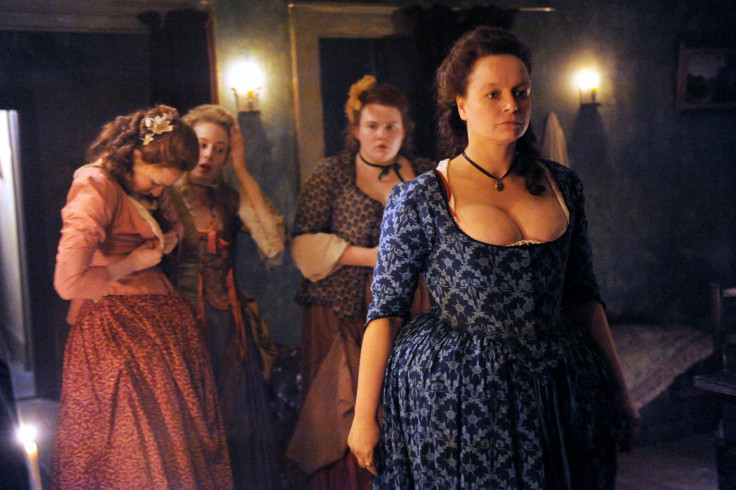Harlots is about whores: living, breathing, loving, laughing, weeping, dying, angry, desperate, witty, traumatized, bored, conniving whores. These women run the gamut of humanity, which is a rare enough achievement for a production about the world’s oldest profession, one that is so often, so poorly and so repulsively romanticized. This difference may be attributable to a female creative team led by Moira Buffini (Byzantium, Jane Eyre) and Alison Newman (Eastenders, Call the Midwife), whose look at the harlots of Harlots allows these women more range of expression than johns’ moist dreams would permit.
The story takes place in 18th century London, a London populated by powdered wigs, bored fops, dangerous dilettantes, and — OMG! — black people. While some reviewers have found Harlots’ exploration of race and slavery in 18th-century London to be less than exhilarating, I’m just happy that these people are here and have lines . Because they were there, “even” in 18th-century London. Thank you, Harlots .
Plucky whoremistress Margaret Wells is married to a black man, William North (played by Daniel Sapani) with a little biracial son, and one of her whores is a dark-skinned woman. We later meet Harriet (Pippa Bennet-Warner), an American slave taken for a wife by an old flame of Margaret’s whose plot provides a bit more of that racial exploration some felt lacking in earlier episodes. It isn’t deep, but it’s present.
But the main plot is the murderous competition between Margaret Wells (a commanding Samantha Morton) and Lydia Quigley (a deliciously condescending Lesley Manville). Margaret runs a common whorehouse but has aspirations for more: more money, more status, more girls, more power. She and Lydia have a shared past, but their animosity runs deep. Their cycle of sabotage gets more and more brutal and ugly with each episode.
On top of that, each woman is embroiled in personal machinations. Lydia is stuck procuring virgins for a mysterious, twisted set of powerful men whom she cannot simply decline with impunity, while Margaret is doing her best not only to move up in the world, but to move her daughters up as well. Older daughter Charlotte (an arresting Jessica Brown Findlay) has a permanent mistress position with petulant manchild Sir George Howard (Hugh Skinner, flopping about and flashing terrifying moues at every turn), while Margaret dotes upon her younger daughter Lucy. Lucy, timid and dull, inspires pity but takes no actions, unlike her riveting sister Charlotte or even firey Emily Lacey (a scene-stealing Holli Dempsey).
It’s hard to say what I find the most addictive thing about Harlots. I love the wub-wub-wub music paired with the elaborate costumes, even if Marie Antoinette did the modern meets period thing back in 2006. I love the elaborate costumes themselves, the improbable height of hair, the fluff and extravagance, the gold-leaf, the heaving bosoms. I love everyone’s stylized prowls and growls, Sir George’s foppish purrs, Margaret’s wild cackle and Lydia’s simpering sneer. I very much enjoy the gold-leaf brothel, the heaving bosoms, the way sex is in almost every scene and in almost every way possible but exhibited as a fact of life, not as a subject of forbidden titillation.
In short, I guess I just love, love, love the drama. A virginity auction! Revenge fucks! A corpse on a doorstep! Dame Death! Bosoms, bosoms everywhere!
While Harlots may be overshadowed by all the hubbub around depressingly timely The Handmaid’s Tale, fans of unabashed melodrama and lavish period pieces should enjoy Harlots, which airs every Wednesday on Hulu.


















